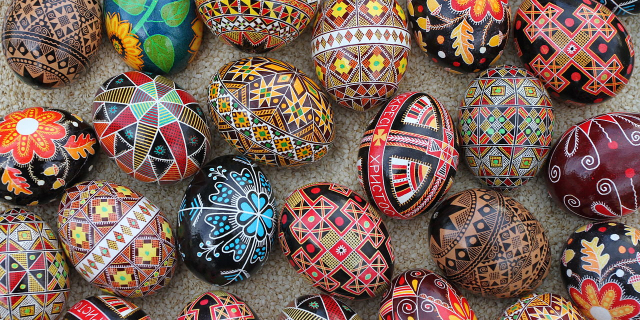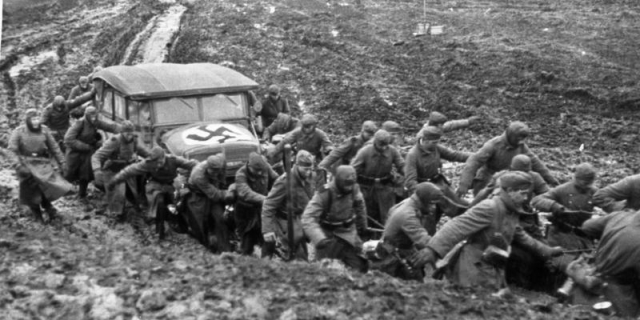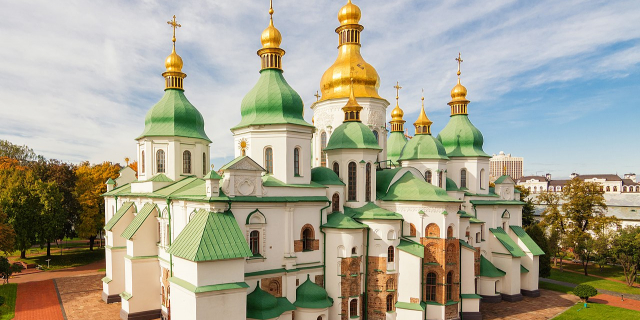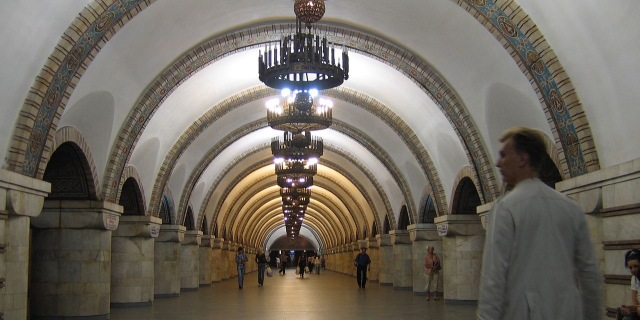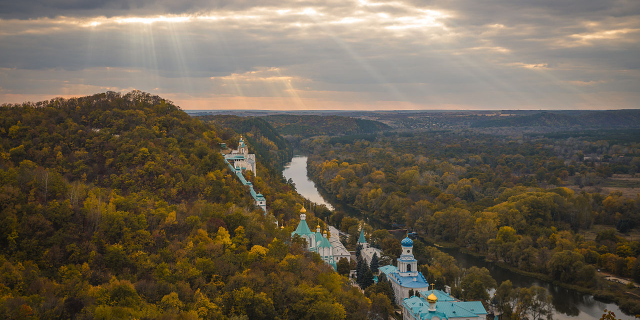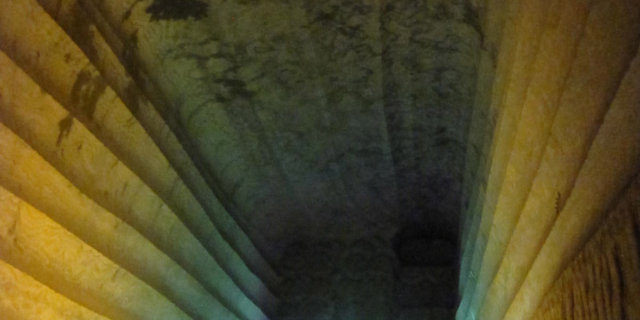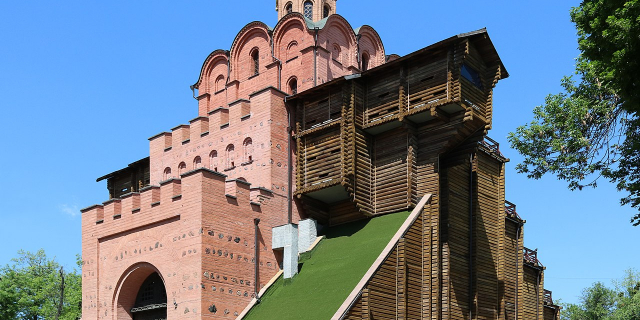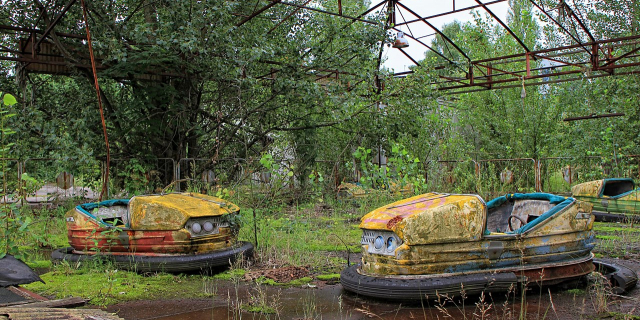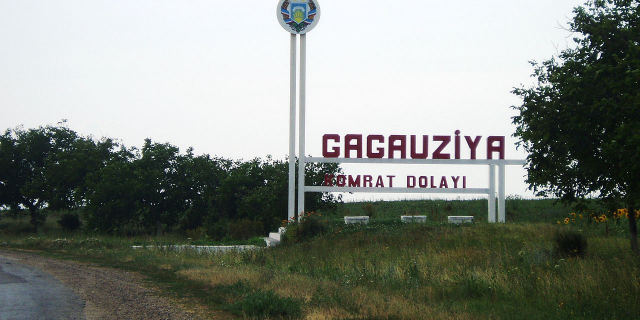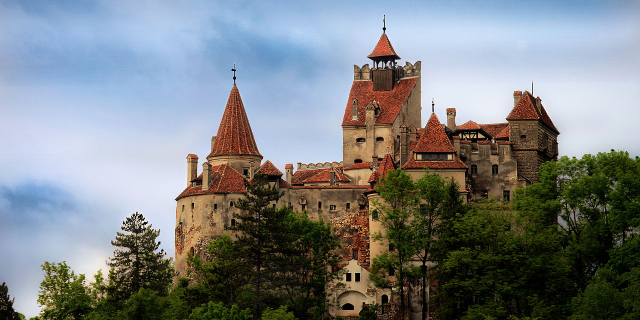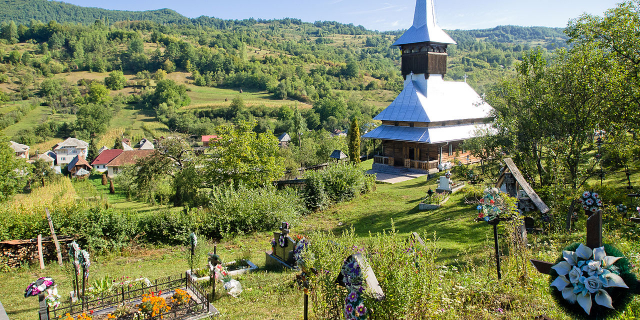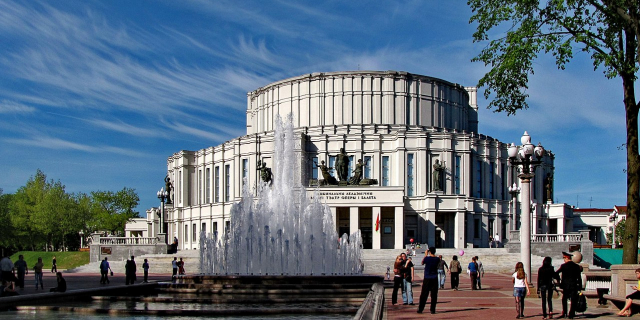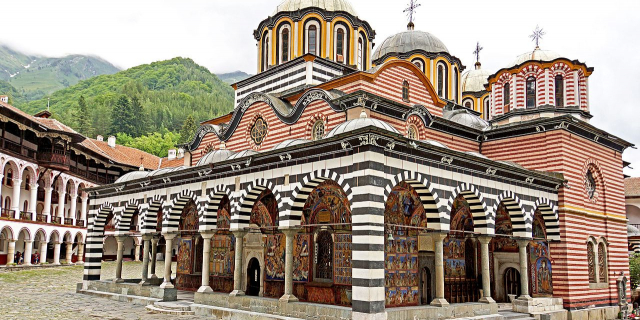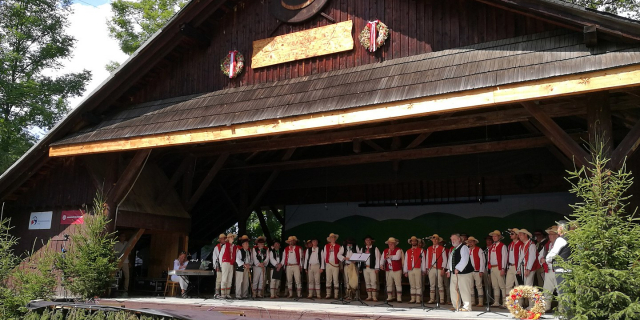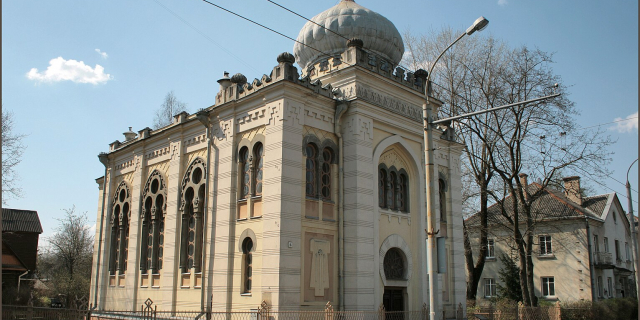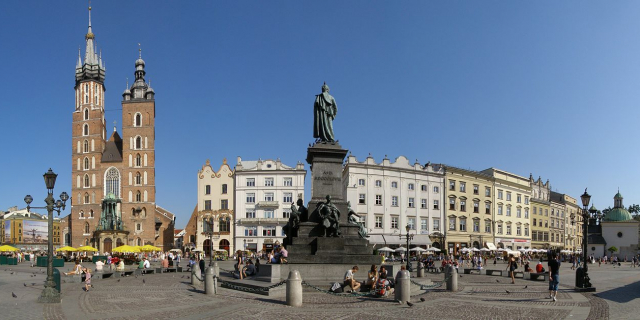Україна
UkraineContext of Ukraine
Ukraine (Ukrainian: Україна, romanized: Ukraïna, pronounced [ʊkrɐˈjinɐ] (listen)) is a country in Eastern Europe. It is the second-largest European country after Russia, which it borders to the east and northeast. Ukraine covers approximately 600,000 square kilometres (230,000 sq mi). Prior to the ongoing Russian invasion, it was the eighth-most populous country in Europe, with a population of around 41 million people. On 1 January 2023, the United Nations estimated the Ukrainian population to be 34.1 million, with record low birth rates. It is also bordered by Belarus to the north; by Poland, Slovakia, and Hungary to the west; and by Romania and Moldova to the south...Read more
Ukraine (Ukrainian: Україна, romanized: Ukraïna, pronounced [ʊkrɐˈjinɐ] (listen)) is a country in Eastern Europe. It is the second-largest European country after Russia, which it borders to the east and northeast. Ukraine covers approximately 600,000 square kilometres (230,000 sq mi). Prior to the ongoing Russian invasion, it was the eighth-most populous country in Europe, with a population of around 41 million people. On 1 January 2023, the United Nations estimated the Ukrainian population to be 34.1 million, with record low birth rates. It is also bordered by Belarus to the north; by Poland, Slovakia, and Hungary to the west; and by Romania and Moldova to the southwest; with a coastline along the Black Sea and the Sea of Azov to the south and southeast. Kyiv is the nation's capital and largest city. Ukraine's state language is Ukrainian; Russian is also widely spoken, especially in the east and south.
During the Middle Ages, Ukraine was the site of early Slavic expansion and the area later became a key centre of East Slavic culture under the state of Kievan Rus', which emerged in the 9th century. The state eventually disintegrated into rival regional powers and was ultimately destroyed by the Mongol invasions of the 13th century. The area was then contested, divided, and ruled by a variety of external powers for the next 600 years, including the Polish–Lithuanian Commonwealth, the Austrian Empire, the Ottoman Empire, and the Tsardom of Russia. The Cossack Hetmanate emerged in central Ukraine in the 17th century, but was partitioned between Russia and Poland, and ultimately absorbed by the Russian Empire. Ukrainian nationalism developed, and following the Russian Revolution in 1917, the short-lived Ukrainian People's Republic was formed. The Bolsheviks consolidated control over much of the former empire and established the Ukrainian Soviet Socialist Republic, which became a constituent republic of the Soviet Union when it was formed in 1922. In the early 1930s, millions of Ukrainians died in the Holodomor, a man-made famine. The German occupation during World War II in Ukraine was devastating, and seven million Ukrainian civilians were killed, including the majority of Ukrainian Jews.
Ukraine gained independence in 1991 as the Soviet Union dissolved, and declared itself neutral. A new constitution was adopted in 1996. A series of mass demonstrations, known as the Euromaidan, led to the establishment of a new government in 2014 after a revolution. Russia then unilaterally annexed Ukraine's Crimean Peninsula; and pro-Russian unrest culminated in a war in the Donbas between Russian-backed separatists and government forces in eastern Ukraine. Russia launched a full-scale invasion of Ukraine in February 2022. Since the outbreak of war with Russia, Ukraine has continued to seek closer ties with the European Union and NATO.
Ukraine is a unitary state with a semi-presidential system. It is a developing country, ranking 77th on the Human Development Index. Ukraine is the poorest country in Europe by nominal GDP per capita, and corruption remains a significant issue. However, due to its extensive fertile land, pre-war Ukraine was one of the largest grain exporters in the world. It is a founding member of the United Nations, as well as a member of the Council of Europe, the World Trade Organization, and the OSCE. It is in the process of joining the European Union and has submitted an application for NATO membership.
More about Ukraine
- Currency Ukrainian hryvnia
- Native name Україна
- Calling code +380
- Internet domain .ua
- Speed limit 130
- Mains voltage 230V/50Hz
- Democracy index 5.81
- Population 41167335
- Area 603550
- Driving side right
- UKRAINIAN UPPER PALAEOLITHIC BETWEEN 40/10.000 BP Bilinsky, Yaroslav The Second Soviet Republic: The Ukraine after World War II (Rutgers University Press, 1964) online Hrushevsky, Michael. A History of Ukraine (1986) Katchanovski Ivan; Kohut, Zenon E.; Nebesio, Bohdan Y.; and Yurkevich, Myroslav. Historical Dictionary of Ukraine. Second Edition. Scarecrow Press, 2013. 968 pp. Kononenko, Konstantyn. Ukraine and Russia: A History of the Economic Relations between Ukraine and Russia, 1654–1917 (Marquette University Press 1958) online Luckyj, George S. Towards an Intellectual History of Ukraine: An Anthology of Ukrainian Thought from 1710 to 1995. (1996) Magocsi, Paul Robert, A History of Ukraine....Read moreRead lessUKRAINIAN UPPER PALAEOLITHIC BETWEEN 40/10.000 BP Bilinsky, Yaroslav The Second Soviet Republic: The Ukraine after World War II (Rutgers University Press, 1964) online Hrushevsky, Michael. A History of Ukraine (1986) Katchanovski Ivan; Kohut, Zenon E.; Nebesio, Bohdan Y.; and Yurkevich, Myroslav. Historical Dictionary of Ukraine. Second Edition. Scarecrow Press, 2013. 968 pp. Kononenko, Konstantyn. Ukraine and Russia: A History of the Economic Relations between Ukraine and Russia, 1654–1917 (Marquette University Press 1958) online Luckyj, George S. Towards an Intellectual History of Ukraine: An Anthology of Ukrainian Thought from 1710 to 1995. (1996) Magocsi, Paul Robert, A History of Ukraine. University of Toronto Press, 1996 ISBN 0-8020-7820-6 Reid, Anna. Borderland: A Journey Through the History of Ukraine (2003) online edition Subtelny, Orest. Ukraine: A History, 1st edition. Toronto: University of Toronto Press, 1988. ISBN 0-8020-8390-0. Yekelchyk, Serhy. Ukraine: Birth of a Modern Nation (Oxford University Press 2007) onlineWorld War IIBoshyk, Yuri (1986). Ukraine During World War II: History and Its Aftermath. Canadian Institute of Ukrainian Studies. ISBN 978-0-920862-37-7. Berkhoff, Karel C. Harvest of Despair: Life and Death in Ukraine Under Nazi Rule. Harvard U. Press, 2004. 448 pp. Cliff, Tony (1984). Class Struggle and Women's Liberation. Bookmarks. ISBN 978-0-906224-12-0. Gross, Jan T. Revolution from Abroad: The Soviet Conquest of Poland's Western Ukraine and Western Belorussia (1988). Lower, Wendy. Nazi Empire-Building and the Holocaust in Ukraine. U. of North Carolina Press, 2005. 307 pp. Piotrowski Tadeusz, Poland's Holocaust: Ethnic Strife, Collaboration with Occupying Forces and Genocide in the Second Republic, 1918–1947, McFarland & Company, 1998, ISBN 0-7864-0371-3 Redlich, Shimon. Together and Apart in Brzezany: Poles, Jews, and Ukrainians, 1919–1945. Indiana U. Press, 2002. 202 pp. Zabarko, Boris, ed. Holocaust In The Ukraine, Mitchell Vallentine & Co, 2005. 394 pp.
- Stay safe War
On 24 February 2022, Russia launched an invasion of Ukraine, from its own territory as well as from Belarus, Crimea and the unrecognized Transnistria. Martial law is in effect. Shelling and air strikes are not restricted to military targets. There have been missile strikes on cities all around the country, and Russian troop incursions have taken place along the northern, eastern, and southern boundaries of Ukrainian control, penetrating deep into the country, particularly in the Kherson area. See War zone safety for some advice and follow local media for more specific directions. Commercial flights have been suspended and roads are jammed. Leaving the country is still recommended, unless you have specific responsibilities and are ready to take the risks of the war.
For your safety, stay away from military facilities, transportation infrastructure (particularly airports) and key government facilities. You are advised to grab the bag filled with necessities like durable food and clothes you have prepared and evacuate to your nearest civil defence shelter when you hear air raid sirens. In major cities like Kyiv, there may be red arrows marked with "Укриття", showing the direction of the nearest shelter. If you don't know where your nearest shelter is or if the nearest shelter is not operational, go to your nearest metro station.
Because of a constant threat of sabotage and false-flag operation, there are reports of people suspected of being enemy saboteurs being shot. Obey all curfew orders and movement restrictions. Don't wear camouflage patterned or otherwise military-like clothing to avoid any possibly-fatal misunderstanding.
Ukrainian males aged 18–60 are not allowed to leave, and are instead required to enlist in the military. There have also been cases of males of other nationalities being denied exit.
...Read moreStay safe WarRead lessOn 24 February 2022, Russia launched an invasion of Ukraine, from its own territory as well as from Belarus, Crimea and the unrecognized Transnistria. Martial law is in effect. Shelling and air strikes are not restricted to military targets. There have been missile strikes on cities all around the country, and Russian troop incursions have taken place along the northern, eastern, and southern boundaries of Ukrainian control, penetrating deep into the country, particularly in the Kherson area. See War zone safety for some advice and follow local media for more specific directions. Commercial flights have been suspended and roads are jammed. Leaving the country is still recommended, unless you have specific responsibilities and are ready to take the risks of the war.
For your safety, stay away from military facilities, transportation infrastructure (particularly airports) and key government facilities. You are advised to grab the bag filled with necessities like durable food and clothes you have prepared and evacuate to your nearest civil defence shelter when you hear air raid sirens. In major cities like Kyiv, there may be red arrows marked with "Укриття", showing the direction of the nearest shelter. If you don't know where your nearest shelter is or if the nearest shelter is not operational, go to your nearest metro station.
Because of a constant threat of sabotage and false-flag operation, there are reports of people suspected of being enemy saboteurs being shot. Obey all curfew orders and movement restrictions. Don't wear camouflage patterned or otherwise military-like clothing to avoid any possibly-fatal misunderstanding.
Ukrainian males aged 18–60 are not allowed to leave, and are instead required to enlist in the military. There have also been cases of males of other nationalities being denied exit.
Scams, robbery and other crimes Ukrainian police in Kyiv
Ukrainian police in KyivAs in any other country, using common sense when travelling in Ukraine will minimize any chances of being victim of petty crime and theft. Try not to publicize the fact that you're a foreigner or flaunt your wealth, through your choice of clothing or otherwise. With the exception of Kyiv, Odessa, and other large cities, Western tourists are still quite rare. As in any other country, the possibility of petty theft exists. In Kyiv, make sure to guard your bags and person because pickpocketing is very common, especially in crowded metro stations. Guides have told tourists to watch certain people because they heard people say: "They look like Americans: let's follow them for a while and see what we can get."
Robberies and scams on tourists are fairly common, especially the wallet scam in Kyiv.
But if you are arrested by police or other law enforcement, do your best to inform them that you're a foreign visitor. Not many police officials speak foreign languages freely, but many people are eager to assist in translation.
Don't drink alcohol in the company of unknown people (which may be suggested more freely than in the West). You don't know how much they are going to drink (and convince you to drink with them) and what conflicts may arise after that. Also, many Ukrainians, known for a penchant for a good drink, can sometimes consume such an amount of vodka that would be considered lethal for the average beer-accustomed Westerner.
Also, it is strongly recommended to avoid individual (street) currency exchangers as there are thieves among such exchangers, that may instead give you old, Soviet-era currency or also coupons that have been withdrawn from circulation since the mid 1990s. Use special exchange booths (widely available) and banks; also be wary of exchange rate tricks like 5.059/5.62 buy/sell instead of 5.59/5.62.
RacismThe area around the American embassy in Kyiv is known for the provocateur groups targeting black people, and there have been reports of such attacks on Andriyivski, the main tourist street that runs from Mykhailivska down into Podil. Particularly in rural areas, having dark skin is often a source of quiet curiosity from locals. Antisemitism is not any more of a problem than it is in Western European countries. Two Jewish mayors have been elected in Kherson and Vinnitsa, and the a elected prime minister (Volodymyr Groysman, 2016-2019) and a president (Volodymyr Zelenskyi, elected 2019) have been of Jewish origin as well.
Russophobia is on the rise as a result of the Russian annexation of Crimea in 2014, its support to separatists, and the full-scale invasion in 2022. Russian citizens may encounter hostility.
Anecdotal experience suggests that in Ukraine, indeed much of the former Soviet Union, people from Middle and Central Asia and Romani/Sinti people receive much closer and more frequent attention from the police. Always have your passport (or a photocopy of the main pages if you're concerned about losing it or if you're staying in a hotel that is holding it) as foreigners are treated more favorably than others. This is not to say that it is unsafe or threatening, but it is better to be forewarned of the realities.
AccidentsWhile there's a lot of swimming and diving attractions throughout Ukraine, local water rescue is tremendously underfunded. It is unlikely that you would be noticed while drowning, especially in a river. Use only officially established beaches.
Ukraine has some of the worst statistics for road related deaths and injuries in the world so act accordingly. Take care when crossing the roads; walk and drive defensively: traffic overtakes on both the inside and outside. Sometimes you even need to take care when using the footpaths, as in rush-hours the black, slab-sided Audi/BMW/Mercedes sometimes opt to avoid the traffic by using the wide pavements; pedestrians or not. Owners/drivers of expensive cars have been known, at times, to be more careless of the safety of pedestrians. Drivers rarely grant priority to pedestrians crossing a road unless there are pedestrian lights. Always watch out for your safety.
Pavements suffer in the same way as the roads in terms of collapsing infrastructure. Take care when walking, especially in the dark and away from the downtown areas of the main cities (a torch is a useful possession) as the streets are poorly lit, as are most of the entries and stairwells to buildings, and the street and pavement surfaces are often dangerously pot-holed. Don't step on man-hole covers, as these can 'tip' dropping your leg into the hole with all the potential injuries!
ProhibitionsIt is illegal to drink alcohol in public places in Ukraine. Despite the prohibition you can see some local citizens doing that, but don’t be misled. These are bad examples. Local policemen can insist on a bribe if they see a foreigner breaking the prohibition. So be wise and avoid unnecessary problems.
SymbolsThe display of communist symbols is illegal in Ukraine, the exception being those located within the grounds of World War II cemeteries.


